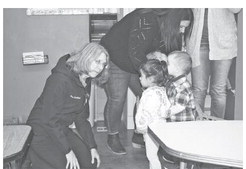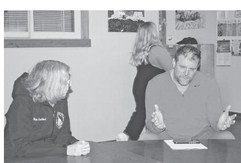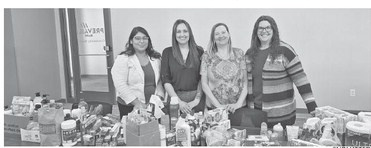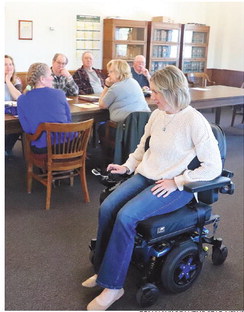N - Rep. Hurd visits Sandbox to talk child care finances


N
ews
Rep. Karen R. Hurd of Assembly District 69 was in Medford on March 21 to meet with board members and employees of Sandbox Child Care & Preschool. Hurd was invited to Sandbox to discuss the impact of expansion of pre-kindergarten programming in public schools.
Hurd, a member of the 2025 Joint Committee on Finance, which shapes the state budget. She toured the facility and met with children before sitting down with Sandbox team members.
“I’m so glad you are here,” said Sandbox director Samantha Hines.
“I am so deep into childcare, this is my area of focus,” Hurd said.
Hines and board president Bryce Kelley relayed the hurdles that Sandbox has been facing due to the decline of pre-kindergarten enrollment as well as the loss of funding granted through Child Care Counts (CCC), a program that was created to support childcare centers through the COVID-19 epidemic. CCC funding has dried up, and it doesn’t appear that there are plans to replace the program.
“It hurt, a lot,” said Hines. “It’s been a struggle.”
Kelley reported that hundreds of childcare centers have closed, likely for the same reasons that Sandbox invited Hurd to visit. He’s concerned about employee retention, stating that 95-96% of general workers make more money than childcare workers, a position which is generally celebrated for nurturing and guiding the community’s children. Kelley reported that their facility has had to push aside employee benefits in order to continue to provide staff their wages, in turn trickling down costs to parents.
“Childcare is still very important in this community,” said Kelley.
He identified that Sandbox is already likely the most expensive childcare option in the area due to the activities, supervision, and meals offered to the children in their care.
Hurd discussed obstacles to securing funding for childcare centers, including the loss of CCC and budgetary limitations she states have been created by Gov. Tony Evers. She talked about the Division of Family Services (DFS) and their numerous regulations, which she said may not always be necessary and can overwhelm a small business. Hurd also spoke of the Department of Public Instruction (DPI) and their ability to oversee collaborative efforts between public schools and childcare centers.
“It’s a money-grab for the schools,” said Kelley of public schools that have initiated pre-kindergarten programs. Hurd reported that 97% of schools, over decades, have created pre-k classes.
Hines mentioned developing such a program and the benefits that children could receive.
“We can find out where they need them to be,” said Hines.
Kelley also cited disparity in property values as an issue. He brought up creating a local partnership with the city to provide childcare centers with basis points, or a Sandbox board president Bryce Kelley relays to Hurd some of the struggles that the facility has faced due to declining enrollments and the loss of a COVID era program.
small fraction of sales tax.
“That’s a possibility,” said Hurd. Kelley stated that most grants and initiatives are only offered to new facilities and not established childcare centers.
Hurd pondered the obligations of the state and how to be sure that childcare centers get the support they need while still maintaining their independence.
“Is that the state’s responsibility, to support all the businesses there are?” she asked.
Hurd will meet with DCF in April and has encouraged the Sandbox team to email her the concerns detailed in Friday’s gathering as it is her intention to relay them to DCF at that time.
“We left the meeting feeling like it went well and how we had expected,” said Jayda Kurtzweil, Sandbox assistant director. “Representative Hurd was able to give us some great information and made it very clear that she is using her voice and doing everything in her power to help childcare and education.”







